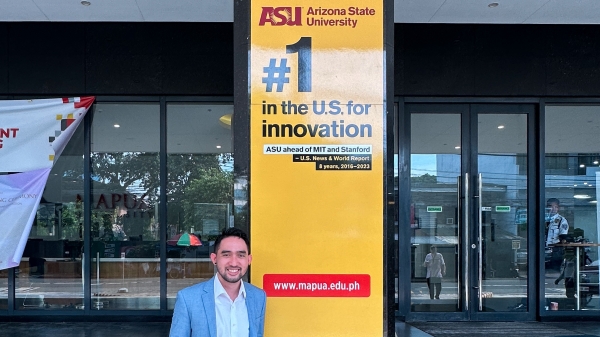Editor's note: This story is part of a series of profiles of notable fall 2020 graduates.
Four years ago, Cheyanne Kratz could never imagine graduating with a degree in nonprofit leadership and management. For her, a college experience was predicated on a few slim options.
“I'm a first-generation college student, so I didn't know anything other than being a lawyer, doctor or engineer,” Kratz said. “I came into school as an environmental engineering major. In high school, I was president of the engineering club. I kind of knew what to expect coming into college. But, when I came to ASU, I felt I was so different from the people in my classes. I had this idea I wanted to be an engineer who implemented water purification systems in third world countries, and then I realized I cared more about helping people than the engineering part.”
Once immersed in Arizona State University's Watts College of Public Service and Community Solutions, Kratz found her groove among a school of individuals who are dedicated to learning about and helping the world around them. To her surprise, it seemed as if it was a program that was immersed in real-world experience.
“Almost all of our teachers have full-time jobs,” Kratz said. “They are actively working in the nonprofit world and have connections that they're bringing into class. Studying nonprofits is somewhat of a new thing at universities, but I think it’s a lot more personable than other majors.”’
For the past two semesters, Kratz has worked at the Sexual and Relationship Violence Prevention office as the marketing and communications peer educator and has also been involved in sorority life and student organizations. For Kratz, this can be one of college’s prime opportunities.
“Get involved no matter what capacity,” Kratz said. “Get involved in sexual and relationship violence, even if you're not super interested. It’s an education we could all use. We’re all trying to have relationships with friends and family we can understand. So, it's super helpful to take one class or go to one club meeting. I’m learning new stuff every single day in the professional world and my personal life.”
As she wrapped up her last semester at ASU, Kratz shared some of her reflections and advice for fellow Sun Devils.
Q: What was your “aha” moment when you realized you wanted to study the field you majored in?
A: I obviously picked engineering. So I changed my major, which was very hard for my family to comprehend. Everyone kind of stereotypically thinks you can't make any money in nonprofits. I had never heard of the major before. I did it on a whim because my engineering advisor suggested it. I’m super thankful it went this way.
Q: What’s something you learned while at ASU — in the classroom or otherwise — that surprised you or changed your perspective?
A: I was in a group in my fundraising development class, randomly picked. I was with some of the most interesting people I've ever met. We worked together to come up with the idea to have a meditation space in a children's hospice center.
It was funny because we all had different personalities and mindsets, but we all collectively found this to be so cool. We were looking up meditation cushions for three hours! Moments like this remind me that nonprofit can also be what you make it — there’s a marketing person, an accounting person, an event planner and even the person who researches meditation cushions. It's funny to me when people wonder what nonprofit actually is because you can be anything you can be in for-profit in a nonprofit.
Q: Why did you choose ASU?
A: I applied to 18 schools and got into all of them! My home is 40 minutes from campus, so ASU wasn’t one of my top choices. But, I ultimately picked ASU because I received a good scholarship and wanted to be able to go to a school where I didn’t have to worry immensely about money. I also applied to a lot of schools on the East Coast but didn’t own any winter clothes, nor had I ever seen snow before. ASU was the best decision for me because the nonprofit major isn’t offered at many schools. So I’m thankful I ended up coming here.
Q: Which professor taught you the most important lesson while at ASU?
A: Gordon Shockley taught my social entrepreneurship class last spring. He had so much passion and opened my eyes to the idea that you can help people in more than the nonprofit sector. So many companies are doing social good. He really pushed us out of the normal. He had us look at people throughout history and where social entrepreneurship really started.
Then we would also talk about entrepreneurs who were working just for profit. We never really talked about profit in my major, so we learned the difference between the people who simply want to make money and the people who are doing it out of their heart but also need to make money. Ever since this class, I have become super interested in social responsibility. I think for-profits have so much power in change, and I think they need to be the ones to step up for there to be change.
Q: What’s the best piece of advice you’d give to those still in school?
A: I think being less stressed about meeting people and putting yourself out there more. I was sometimes afraid to go to clubs or try things alone. I look back and think, “the PAB would’ve been fun” or opportunities like that. Especially now with most classes on Zoom.
I go to ASU 101 classes and teach sexual education, and I always tell them that Zoom makes it easy to hop in and out. It’s not like physically walking to a meeting. Give it a try. Go to a Bingo night or yoga session; they’re fun. I wish I did more of that.
Q: What was your favorite spot on campus, whether for studying, meeting friends or just thinking about life?
A: I really like Coor Hall and the tables outside. That’s where I would see the most people on campus. I liked being there and seeing people interact. That’s where I really felt like a college student. I also really liked the courtyard outside the law school on the downtown campus.
Q: Do you have any plans after graduation?
A: Yes, I’m attending grad school at Indiana University for their master’s in public affairs program. Before, I applied to a million jobs, but nonprofits aren’t getting enough funding right now and aren’t eager to employ someone who graduated during COVID-19.
In my head, I thought, everyone is going to need someone to help them because nonprofits work on helping when there is a crisis, and there’s this pandemic going on. But it really affected the galas, fundraising and donations. Then, they can’t physically help the people they need to help because of guidelines and social distancing protocols.
Q: If someone gave you $40 million to solve one problem on our planet, what would you tackle?
A: That’s hard. There are some things that will always be bigger than what you’re passionate about. I love the work that I've done in the Sexual and Relationship Violence Prevention office. I think that sexual education throughout the whole world would be so good, especially in countries where cultures are against providing birth control, STD testing and sexual education, in general.
I think that would not only save many lives but livelihoods. I worked at a women's shelter here in Arizona, and we could essentially only hand out diapers for adults because of the stigma surrounding birth control. Then we would see tons of 14 and 15 year olds who were pregnant because they’re not receiving birth control or education about it.
Written by Julian Klein, ASU Student Life
More Health and medicine
Is ‘U-shaped happiness’ universal?
A theory that’s been around for more than a decade describes a person’s subjective well-being — or “happiness” — as having a U-…
College of Health Solutions medical nutrition student aims to give back to her Navajo community
As Miss Navajo Nation, Amy N. Begaye worked to improve lives in her community by raising awareness about STEM education and…

Linguistics work could improve doctor-patient communications in Philippines, beyond
When Peter Torres traveled to Mapúa University in the Philippines over the summer, he was shocked to see a billboard promoting…
